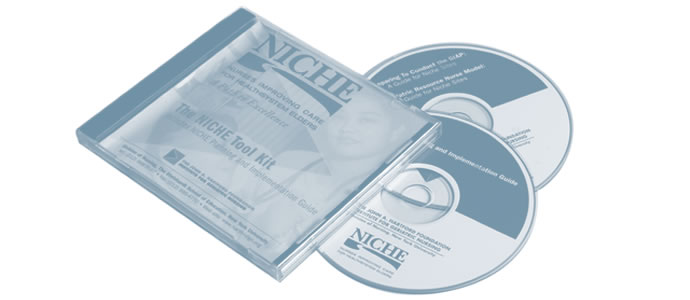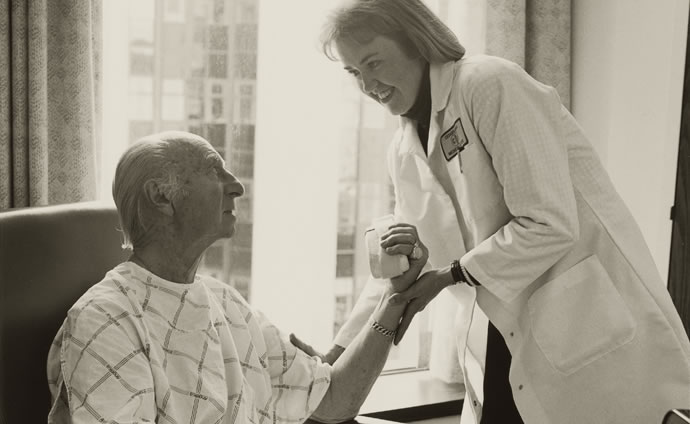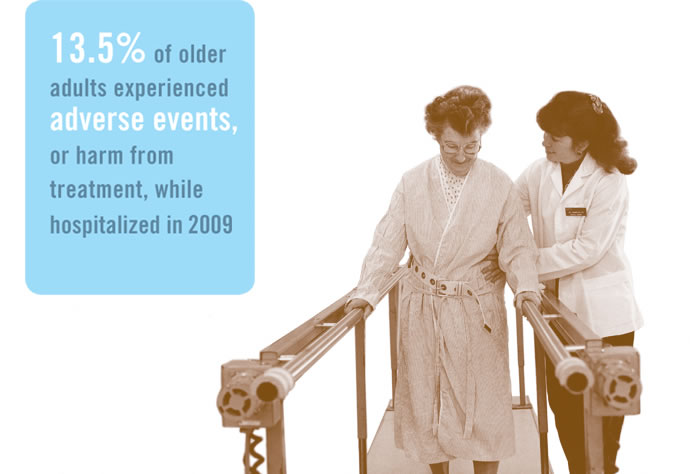INNOVATIVE MODELS OF CARE

Reducing Adverse Effects of Hospitalization for Older Adults
1989-present For many hospitalized older adults immobility can negatively impact physical function and increase risk for pressure ulcers. They also are at risk for delirium, hospital- acquired illnesses, and other adverse events. The Foundation’s Hospital Outcomes Program for Elders (HOPE) provided over $3 million to six health care organizations to support different strategies to alleviate negative effects of hospitalization, with additional grants for evaluation.Two of these projects continued after the grant period ended:
Acute Care for Elderly (ACE) units in hospitals provide specialized interventions and interdisciplinary team care to minimize functional decline in older patients. The model was developed and tested by C. Seth Landefeld, MD, and colleagues.
ACE units have been installed at many academic medical centers and community hospitals throughout the United States. A recent study by Dr. Landefeld, who is now Chair of the Department of Medicine at the University of Alabama at Birmingham, found that the average length of stay was shorter for patients in ACE units and these patients incurred lower hospital costs.
 (Above) NICHE provides materials that nurses working at the bedside can use to improve care of older adults.
(Above) NICHE provides materials that nurses working at the bedside can use to improve care of older adults.
(Below) With funding from the Foundation’s HOPE initiative, Cedars Sinai Medical Center in Los Angeles, CA, developed and tested a program of exercise to prevent functional decline for hospitalized elders.

“What do most elderly people want to do at the hospital? They want to go home, and they want to get there as soon as possible.” C. Seth Landefeld, MD
Chair, Department of Medicine
University of Alabama at Birmingham
Nurses Improving Care for Healthsystem Elders (NICHE) focuses on programs and protocols that are under the purview of nurses. Examples include fall prevention, assessing for delirium, dementia care, wound care, and pain management. The NICHE program provides hospitals with the tools to educate nurses and create the systemic changes necessary to support nurses in their efforts to improve quality of care to older patients. NICHE began as a free-standing program in 1992 and was incorporated into the Hartford Institute for Geriatric Nursing in 1995.
With assistance from The Atlantic Philanthropies, which provided $5 million to develop and implement a business plan, the Hartford Institute for Geriatric Nursing built the infrastructure to make the NICHE program financially self-sustaining. NICHE has been implemented in almost 450 hospitals and health systems.
NICHE and ACE showed that it was possible to reduce the dangers of hospitalization for older adults. The Foundation and its grantees also believed that avoiding hospitalization entirely would be even better (Hospital at Home).
“NICHE is not about just training one person, but rather how to embed certain practices into the system in a way that is ongoing and self-sustaining.” Elizabeth Capezuti, PhD, RNDr. John W. Rowe Professor in Successful Aging
Co-Director
Hartford Institute for Geriatric Nursing
NYU College of Nursing
 As part of the Foundation’s HOPE initiative, physical therapist Jill Johnson at St. Mary’s Hospital Medical Center in Madison, WI, worked with a patient to maintain her mobility.
As part of the Foundation’s HOPE initiative, physical therapist Jill Johnson at St. Mary’s Hospital Medical Center in Madison, WI, worked with a patient to maintain her mobility.